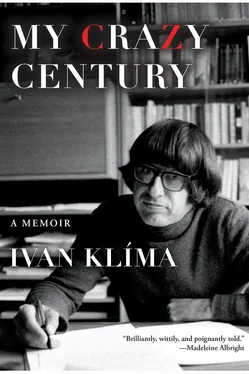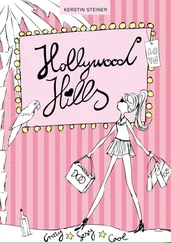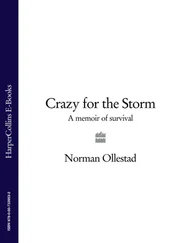At the same time, the judge allowed that the machines Father had designed were so demanding that the personnel at the manufacturing plant could not even assemble such complicated apparatus.
The court also established that the accused attempted to refute most of the accusations by claiming he had tried to point out and warn against these shortcomings during the manufacturing process.
“The national economy, however, has suffered considerable damage, the extent of which it is impossible to determine without a thorough investigation,” he continued in the voice of a weary shopkeeper who toward evening was already suspecting that no one would buy his limp produce. “Nevertheless, the court believes it cannot conclude that the accused is guilty of sabotage, for he attempted to rectify the situation.”
Father and the other accused engineers were sentenced to thirty months in prison; father was also fined two thousand crowns.
Immediately after the trial, the agitated attorney ran up to me and led me aside where no one could hear us and said the court was supposed to sentence them only to the time they had served during the investigation, and because all of the accused had been given a year’s pardon owing to the recent amnesty, they could go home immediately, but the blockhead of a judge did not take into consideration that Father had been arrested three months later than the others, so he’d actually given him three extra months.
I confessed that I had no idea what Father had been found guilty of, since he clearly had not done anything unlawful.
“But my dear boy,” said the attorney, amazed, “it’s a matter of how things are interpreted, not how they are in reality. That would smack of bourgeois rule, wouldn’t it? Just a year ago, your father would have received at least twenty years for the same thing. And a year before that. . It’s best not to think about it.”
*
When I next brought one of my reviews to the editorial office of Mladá fronta, I was asked if I’d like to take a trip to one of the border regions and write a news story about it. At that time, the Union of Youth had announced a big campaign of long-term agricultural brigades to the border regions, which had still not managed to recover from the mass deportation of their German inhabitants.
I said I’d be glad to try.
They also wanted to know if I had a special relationship with any particular part of the border regions, and, fearing they might change their mind, I said I liked Šumava.
Šumava appealed to them as well. A certain group of brigade workers in the Kašperské Mountains were promising to harvest the hay on fifty acres of mountain fields even though they had only two scythes. This time I had no one to invite to accompany me, so the next day I got on my bicycle and took off in the direction of Plžeň. Along with my ordinary things, I took with me a folding map from 1935, which displayed features that were missing from contemporary maps for reasons of secrecy. It also listed the population from 1930. I read that in the district of Sušice, where the Kašperské Mountains were located, there had been twenty thousand Germans. Now they were undoubtedly no more.
After nine hours, I rode into town, where it looked as if the war had ended only a few weeks ago. I climbed off my bicycle, went into a restaurant, and sank down on the nearest chair. At a long table sat two scruffy, ragged, and obviously somewhat drunken men who looked at me with apparent suspicion or perhaps even malice. In the tavern, which reeked of cheap cigarette smoke, beer, goulash, and mildew, sat several other half-drunken, scruffy fellows wearing overalls. In the corner of the room sat a group of young people bawling out a drunken song, or at least trying to.
After a while a similarly drunk waiter shambled over and wordlessly placed before me a half liter of beer. Sometime later he appeared with a bowl of soup, and I asked where I could register for a room.
He was surprised it had occurred to me I could get a room here; maybe in Sušice at Fialka, he suggested. It was a big hotel. I said I couldn’t make it to Sušice; there had to be someplace in town I could spend the night.
Maybe at the farmhouse where they took all the military bunks. There would certainly be a free spot there since half the brigade workers had already run off. He pointed at the group of young drunks sitting in the corner, and I realized that these were the brigade workers I’d pedaled nine hours to see.
There were ten of them, six boys and four girls. None of them was wearing the blue Union of Youth shirt. The girls seemed drunker than the boys. A quite pretty brunette was wearing a khaki military shirt almost completely unbuttoned with nothing covering her breasts. She was sitting on the lap of a boy dressed like a cowboy and giggling. When I walked over to the table, the boy pushed her off, lifted his cowboy hat, and waved to me. He was obviously the leader.
I asked him for a place to spend the night but I did not betray my journalistic profession. I said I was a student on vacation; this cheered up the brigade workers, and they wanted to know if I perhaps intended to leave the country. I denied any such intention, and this cracked them up again. They assured me I had nothing to be afraid of. Some of them had come to Šumava for precisely that reason, but then they discovered they couldn’t leave through here because those green swine would start shooting right away. It’s better to go through Berlin.
I tried to ask them what it was like living here. My inquiry struck them as amusing. Couldn’t I see? There was nothing to do except get drunk. Sometimes there was some shooting going on. And the pigs squeal a lot because there’s nothing to feed them.
Then they ceased paying attention to me, and I didn’t dare disturb them.
The waiter chased us out sometime after midnight, and I skulked behind the singing brigade workers to the farm. In a large barn by the light of an oil lamp, I counted twelve military bunks with bare straw mattresses — two were empty. One of the girls reeled over to me carrying three blankets and suggested I put one under my head. There was a pump in the yard if I wanted to wash up.
When I awoke in the morning, the bedroom was already half empty. Two brigade workers were getting ready to go to the dentist in Sušice, and if I wanted a ride, the bus was leaving in a moment. The girl who had been sitting on the lap of the comrade wearing the cowboy hat was still asleep, with her head wrapped in a wet towel. Another was just walking into the room with a bucketful of water and a rag tied around a broom.
I said I would like to pay for my bed.
Payment was not necessary; the beds were free. She laid aside her broom and complained for a bit. If they didn’t get a little milk from the cows and hadn’t found some year-old potatoes in the basement, they would have died like the pigs here who are dying of hunger. Then she led me to the sty to see several gaunt and squealing swine. Behind them stood two filthy goats.
I went back to the pub for breakfast. The now sober waiter asked me how I’d slept. He then wanted to know which one I’d chosen. They’re all sluts, he explained. Why did I think they had come here? They wanted to get rid of them at the factories, so they booted them to this place. Here they had plenty of customers, and he pointed to the tavern where several border guards were standing.
Afterward, I climbed a steep hill above the town. I saw several cows being watched by a boy around my age. He was sitting, leaning against a tree and smoking a small pipe. I recognized him as one of my bedfellows.
He was surprised I was still around. Did I perhaps relish the beauty of the wilderness? It was the asshole of the world is how he explained his relationship to the local splendor. I tend cattle, he added as if in apology. They couldn’t find anything else for him to do.
Читать дальше












